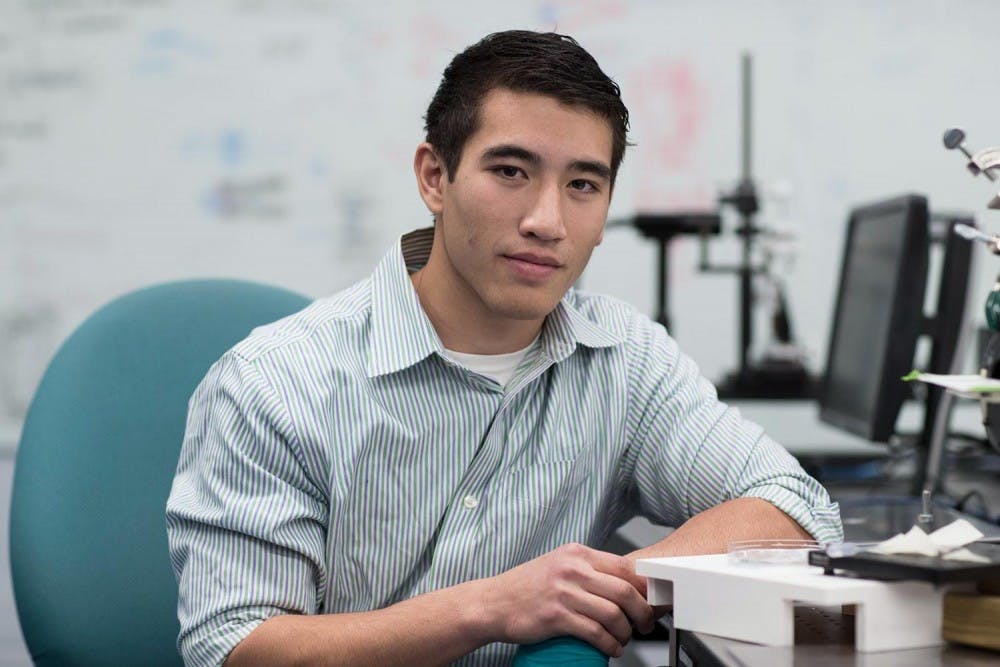Third-year Engineering student Matthew Asper has been named as one of “Tomorrow’s Technology Leaders: The 20 Twenties” by Aviation Week Network, in collaboration with the American Institution of Aeronautics and Astronautics . Asper is an Aerospace Engineering major and Material Science Engineering minor.
This award is part of a larger effort that brings together technology managers with students and faculty to improve success and innovation in the aerospace field. While students are able to build a network with technical experts who have helped shape the industry, universities can gain knowledge of highly distinctive educational opportunities provided to students, and technology managers can cooperate with the best among the next generation of aerospace talents.
Specifically, the award recognizes students, who have been nominated by their university, based on the three pillars valued by the aerospace industry — learning, civic service and high-value research. As a result, nominees are evaluated on their academic performance, civic contribution and research project.
Asper’s research focuses on the problem of aircraft icing, which occurs when airplanes fly at high altitudes and are met with freezing rain or snow, causing the precipitate to freeze upon impact. To solve this problem, Asper is investigating two different methods. The first method — sponsored by Rolls-Royce — looks at nanocomposite coating to prevent ice accretion in turbine engines.
“[Nanocomposite coating] tends to make the water droplets bead up on the surface so that it’s easier to roll off due to aerodynamic forces,” Asper said.
The second method uses a ceramic porous material connected to a back pressure system. This contraption minimizes icing by essentially levitating the water droplets when they attempt to land on the aircraft at high altitudes.
Asper began conducting research on aircraft de-icing methods in May 2017 after he applied and was accepted to work under the mentorship of Eric Loth, the chair of Mechanical and Aerospace Engineering at the University.
Asper’s interest in aerospace engineering emerged in high school when he realized he wanted to become an astronaut because of his interest in math and science. He applied for the project under Loth, as it integrated his major in aerospace engineering, as well as his minor in material science engineering.
“Given the fact that I’m minoring in material science, and we are utilizing pretty innovative materials especially to the aerospace industry, that’s one of the reasons why I applied,” Asper said.
While Asper is ecstatic that recognition of his research with this award celebrates his own accomplishments, he is more excited that the University is now getting the recognition it deserves for aerospace engineering research.
“It feels really good to be recognized, and it gives me a sense of pride, especially the fact that I get to represent U.Va. in aerospace,” Asper said. “Around the world, this is an award that many aerospace professionals will see — people have won the award in Cambridge and MIT. … U.Va. can do really groundbreaking research as well, even though they may not be known for aerospace engineering like MIT or VT.”
Besides conducting research, Asper is also heavily involved in the student chapter of the American Institute of Aeronautics and Astronautics at the University.
Last year, as president, Asper along with Christopher Goyne, an associate professor of mechanical and aerospace engineering, organized an AAIA conference with over 100 participants from universities across the Northeast. At the conference, students — who had submitted abstracts — were judged on their research. Asper was involved in organizing the venue, coordinating the budget and inviting renowned speakers.
“The conference went very smoothly and it was performed under budget, and it was held on time thanks to Matthew’s hard work and dedication,” Goyne said.
Asper organized the conference as a second-year student at the University.
“It was extremely impressive for someone who was a second year at the time,” Loth said. “That’s something a graduate student would usually do. Here’s a second year working with professionals all over the U.S.”
Asper is also a member of Tau Kappa Epsilon fraternity, the Cycling Club, the Triathlon Club and the Combat Robotics club. He plans to continue his study in aerospace and pursue a Master’s or Ph.D. degree in the field.
“We are really happy to have great undergraduate scholars like Matt,” Loth said. “He exemplifies many of the great students we have here. Even though he is the one that got the award, we have several fantastic students, so U.Va. is really blessed in that respect.”







